New Jersey Furniture Maker Has Unique Solution to Rising Labor Costs
A story that can only be told once a year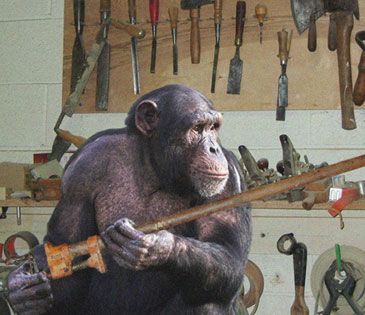
LAMBERTVILLE, N.J., APRIL 1, 2008–When it comes to employees, New Jersey custom furniture-maker Rick Tocce is monkeying around–literally. Faced with soaring labor and insurance costs at his New Jersey workshop, Tocce has enlisted the help of our primate brethren to bring production overhead under control-and stay local. While his rivals have resorted to outsourcing work overseas, Tocce has stubbornly remained a US-based manufacturer. “We’re not going anywhere,” he stated. Part Henry Ford, part Doctor Doolittle, Tocce has managed to assemble a workforce made up almost exclusively of apes and monkeys. And to the bewilderment and consternation of his competitors, his simian experiment seems to be paying off.
 “I don’t know what all the fuss is about,” Tocce said. “Humans have used work animals for eons: oxen, mules, sheep dogs. In India, elephants serve as highly valued organic backhoes; the Indians treat them as family members, and will actually have a funeral for the animal when it passes on. The problem with zoos,” he continued, “is that the animals have nothing to do; they’re bored out of their minds. And when a primate gets bored it will exhibit behavior that . . . well . . . makes a parent cringe. You’d think they would offer them an arts and craft class to challenge them and keep the cobwebs away. That’s what we’re doing. Our guys work, and work hard, for their ‘three squares.’ And, frankly, I think they prefer it that way.” (Left, a gorilla begins his lunch break)
“I don’t know what all the fuss is about,” Tocce said. “Humans have used work animals for eons: oxen, mules, sheep dogs. In India, elephants serve as highly valued organic backhoes; the Indians treat them as family members, and will actually have a funeral for the animal when it passes on. The problem with zoos,” he continued, “is that the animals have nothing to do; they’re bored out of their minds. And when a primate gets bored it will exhibit behavior that . . . well . . . makes a parent cringe. You’d think they would offer them an arts and craft class to challenge them and keep the cobwebs away. That’s what we’re doing. Our guys work, and work hard, for their ‘three squares.’ And, frankly, I think they prefer it that way.” (Left, a gorilla begins his lunch break)
Experts are perplexed. Dr. William Costello, head of primate studies at the Pan-continental Animal Alliance (PCAA), was initially concerned about Tocce’s workplace conditions, and how the animals were obtained in the first place. “I was alarmed when I first learned that a New Jersey furniture manufacturer had a collection of Chimps, Orangutans and Gorillas that rivaled the San Diego Zoo.”
Tocce calmly addressed these issues: “First, all of our staff were obtained legally and ethically. Many were purchased from labs-when they’re done probing and injecting them. Let me tell you, they’re usually a sorry sight and require quite a bit of physical therapy. Others were bought from small ‘zoos’-for lack of a better word. Florida has a million of these roadside attractions-which are usually dreadful. And then there is the shrinking habitat in Africa. Just last week we got two Silverback Gorillas who were snatched from the jaws of poachers. I’m sorry, but I can’t feel bad about that. They’ll have a better life here in Jersey for sure; there they were destined to become bush meat or aphrodisiacs. And talk about King Kong, these fellows can carry more lumber in an eight-hour day than any twenty stout men. Incredible!”
 “As for our work conditions, our shop strictly conforms with OSHA regulations-as we should. I have even gone so far as to have custom-sized dust masks and hearing protection made. It costs us a small fortune, but it’s the right thing to do. A mask that fits the Rhesus, who do the medium sanding–120 to 150 grit–won’t fit the Spiders, who do the final 220-grit work. Safety is number one. I’m proud to say that we’ve gone 469 days without a work-related injury. Not bad. What’s GM’s record?”
“As for our work conditions, our shop strictly conforms with OSHA regulations-as we should. I have even gone so far as to have custom-sized dust masks and hearing protection made. It costs us a small fortune, but it’s the right thing to do. A mask that fits the Rhesus, who do the medium sanding–120 to 150 grit–won’t fit the Spiders, who do the final 220-grit work. Safety is number one. I’m proud to say that we’ve gone 469 days without a work-related injury. Not bad. What’s GM’s record?”
Dr. Costello has made the 50-minute trip from his PCAA office to Tocce’s workshop at least once a week since February. “My initial worries flew out the window the second I walked into the building. In fact, I am still bowled over by what I have observed. Twenty-seven years in Haplorrhini studies [tarsiers, monkeys, apes, and humans] didn’t prepare me for this. I am rethinking everything. Just last week I witnessed a Macaque teaching a Howler how to sharpen a chisel. Think about it: one monkey species instructing another on tool usage. This is earth-shattering,” Dr. Costello exclaimed. (Above, a worker handles a complex glue-up.)
Tocce beamed when speaking of the variety of primates employed at his shop. In fact, his workplace is virtually a United Nations of monkeys and apes. Animals that in their native habitat would be separated by continents and vast oceans now work shoulder to shoulder toward a common goal: building high-quality furniture.
“Every one of these species has its strengths and weaknesses-the same can also be said about us I guess,” Tocce added. “Take the Gibbons, they’re murder in the finish room–terrible. Milt, our top Gibbon over there, drips paint like Jackson Pollack. But hand him a router and he is a regular Norm Abram. Weirdly it’s the Orangutans-and only the Orangutans-who can handle a spray gun. Go figure. Now the Bonobos [cousin of the Chimpanzee, and closest genetically to humans] are so bright that we have a few learning Excel; they’ll be able to help out in the office. But they’re promiscuous buggers,” Tocce laughed. “Three of our gals are out on maternity leave. We now keep the males and females separated during business hours. The Planned Parenthood folks are scheduled to come and give a talk.”

Tocce’s portfolio of clients is impressive. He brushed it off humbly. “I’ve been lucky. We’ve had the opportunity to work for most of the big Princeton architects: Graves, Hayden, Richardson-Smith. They’ll drive you crazy if you let them. Got some work into the Philly Art Museum too.” Asked specifically about working for Michael Graves, Tocce shrugged his shoulders: “Just another client.” (Above, one of Tocce’s workers with a model of one of Michael Graves’s buildings.)
I was curious to know whether his customers had quality concerns . . . considering his unique workforce. Tocce’s face turned suddenly serious. “Look, these creatures can work to an amazing level of precision if they’re given half a chance.” Pointing to a Mandrill, he said, “Cindy there spends most of her free time improving her ‘chops.’ The other day on her lunch break she made a hand-cut dovetail that would have made Tage Frid envious. She’s to be applauded. This is what it’s all about!”
“You see, our biggest obstacle isn’t quality-that’s a piece of cake for these guys. It’s that we have become something of a curiosity. People are always dropping in: architects and other clients–usually with their kids in tow. And researchers,” he said, shaking his head. “There seems to be an endless queue of scientists at our door. Production comes to a crashing halt.” Tocce’s commitment to his workers is rivaled only by his business discipline. “The bottom line is never far from my mind. We’re furniture makers, all of us, not a lab experiment or a Vaudeville act or a freak show.”
With that, he excused himself from the interview and headed briskly toward a group of Baboons who were huddled over a blueprint.
Photos by the author
-This labor-saving measure will prove more difficult in light of new legislation to ban interstate commerce in primates.
Fine Woodworking Recommended Products
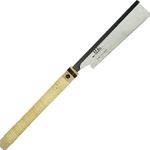
Suizan Japanese Pull Saw









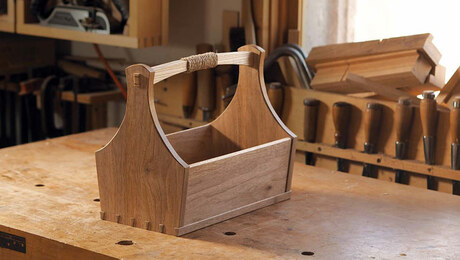

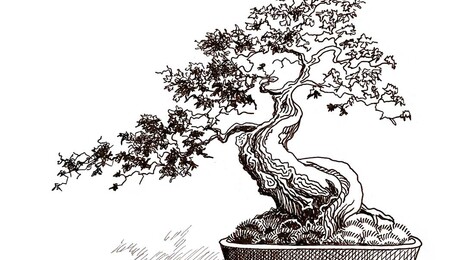
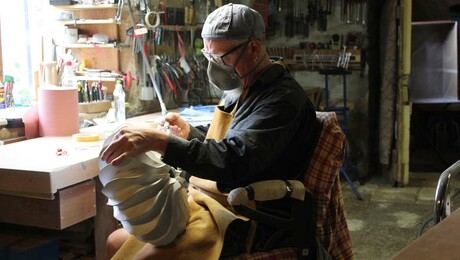







Log in or create an account to post a comment.
Sign up Log in